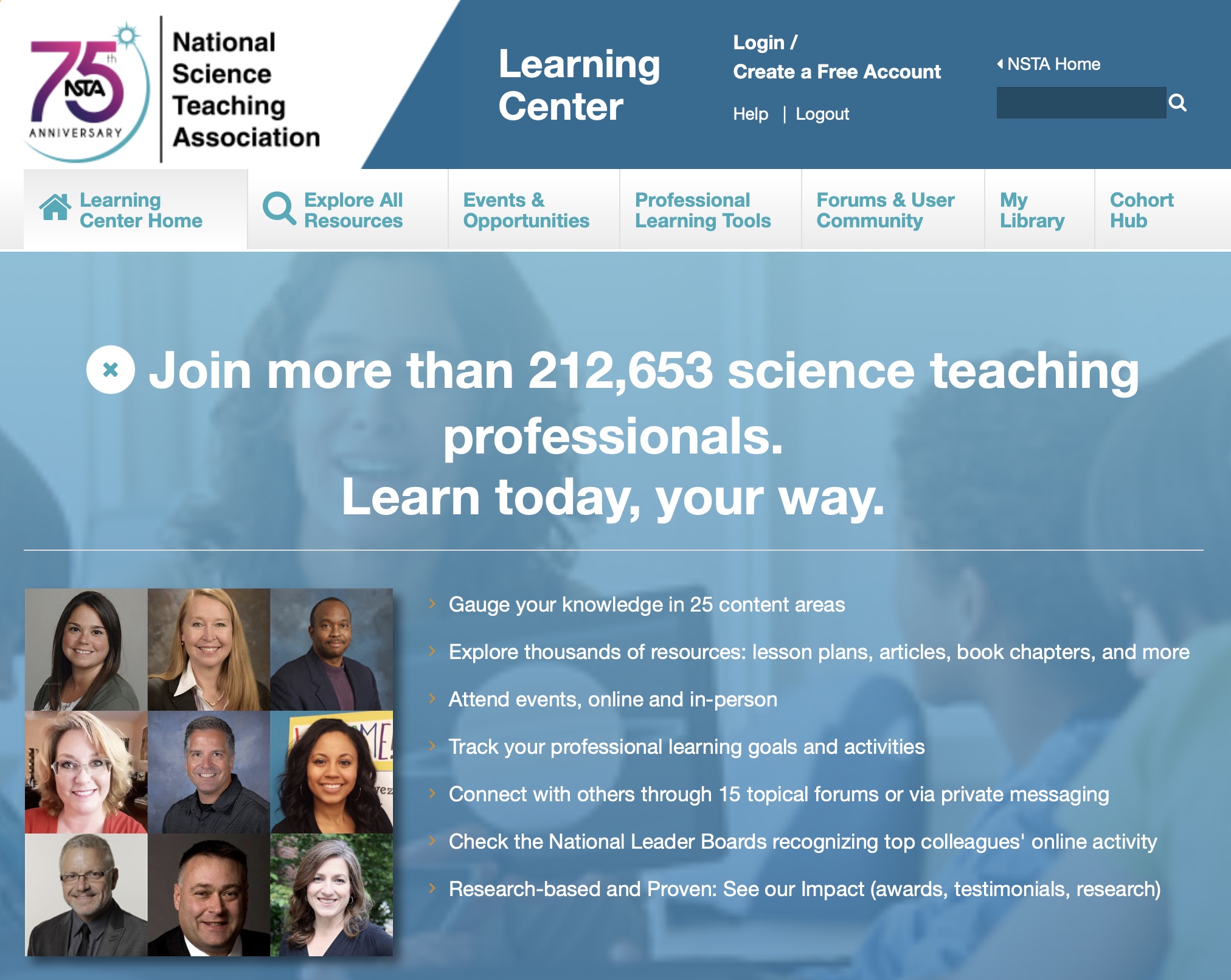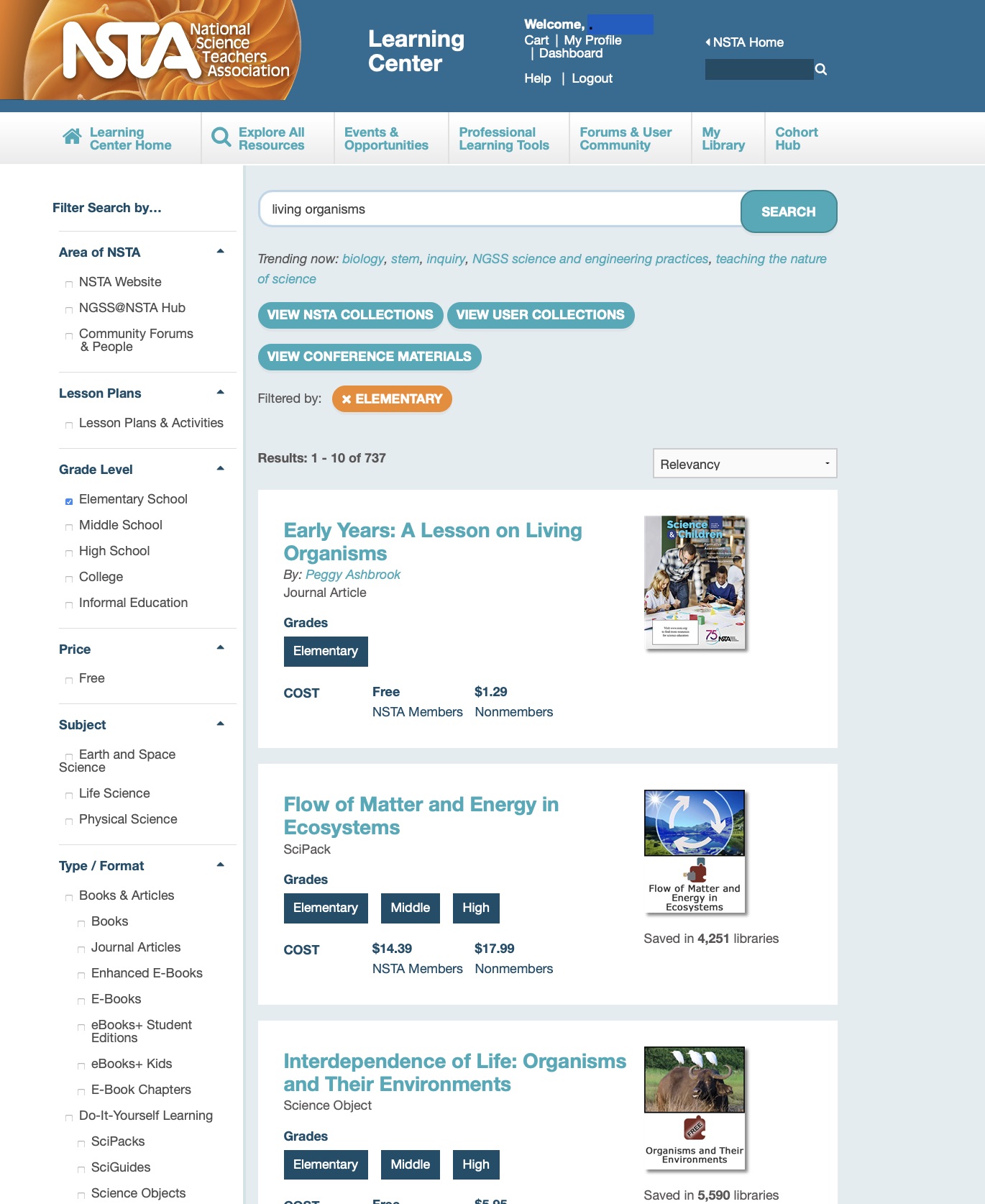Connecting with the education community online to find resources
By Peggy Ashbrook
Posted on 2019-09-24
To support my science teaching practice I look for information about teaching young children, and about the science content I think is important for the young children in my program. I have a lot of questions about both these areas:

- What resources are up-to-date on the science of how children learn?
- What is the most important science content to teach at the age/grade level I work in?
- Which sources of science content information should I use to make sure I have accurate information?
- Where can a teacher who is just beginning to teach science learn science concepts?
- Are there experiences and investigations developed—and tried with children to see if they are effective—that I can use (with attribution)?
And how do I get answers to these questions!?
The National Science Teaching Association (NSTA) is one of several organizations with many good resources—we just have to dig a little to find them. A productive way to access them is through the NSTA Learning Center as long as you know in general what you are looking for and you do a little research into the NSTA resources before asking for others to provide you with the appropriate resources.
When posting in online forums of any kind, it is helpful to start with refining your request for help and by doing some research to show your professionalism before asking for assistance.
Refining your request:
Do show that you have a specific area of interest. Include some background in your question, such as the age/grade level you will be working with, what area of science the experience/activity/lesson/inquiry should involve, and what other factors need to be considered (size of the group, any specific needs children have, does literacy or other domain need to be well integrated, available materials, and any concerns you have about classroom management).
A request for help such as, “I’m looking for a simple science lesson that will engage children in elementary grades and be fun,” may not generate much interest on the NSTA Learning Center forums. It is likely to get the vague response, “Look on Pinterest.” Let’s add the details that make it easy for other educators to respond with information that will be helpful:
“I’m a preservice teacher who is working with a kindergarten class and I want to teach about living organisms. I see in the NGSS Appendix E – Progressions Within the Next Generation Science Standards that “All organisms have external parts that they use to perform daily functions” is the appropriate core idea for this age group. I want help creating an engaging lesson, or series of lessons that are simple to implement yet still meaningful and fun for the lower grades. I will only have 30 minutes each week. Do you have a lesson or can recommend another resource?”
Do some prior research:
For a lesson plan that has already been tried and found to be effective—and has up-to-date science content and student expectations—search the NSTA Learning Center for articles from Science and Children.
Select “Explore All Resources,” type in the general content of interest (such as “living organisms” or “weather”), and select “Elementary” grade level. Thousands of resources will be listed but do not despair! You can reduce the number of suggested resources by further filtering. Type in the general content of interest again in the new Search window. Try additional filters of “Lesson Plans,” “Journal Articles,” or “User collections,” one at a time to see which filter brings up the most easily accessed resources. Yes, you will probably have hundreds of resources to search though, and that is both the value of the NSTA resources and part of becoming more knowledgeable.
Now that you have a few articles or books that you think will be helpful, add that information to your post on the NSTA Learning Center forum to show your professionalism:
“I’m a preservice teacher who is working with a kindergarten class and I want to teach about living organisms. I see in the NGSS Appendix E – Progressions Within the Next Generation Science Standards that “All organisms have external parts that they use to perform daily functions” is the appropriate core idea for this age group. I want help creating an engaging lesson, or series of lessons that are simple to implement yet still meaningful and fun for the lower grades. I will only have 30 minutes each week. Do you have a lesson or can recommend a resource? I found “Early Years: A Lesson on Living Organisms from the 7/1/2019 issue of Science and Children.” Can you recommend a lesson or a resource like this?”
Once you get a resource, use the sets of questions from the NAEYC Early Childhood Science Interest Forum (ECSIF) (Peterson et al 2019) to tell if the suggested experiences/lesson plans/inquiry activities, or others you found on the web, are of high quality. These questions will help you determine if the activities engage children in the practices of science and engineering (NRC 2013), don’t underestimate children’s abilities to learn core science ideas, and provide the necessary time children will need to deeply engage in meaningful scientific questions and engineering problems (which is what makes it fun!). And to avoid craft-only, teacher demonstrations, or prescribed steps for children to follow exactly, which don’t honor or support children’s growing science understandings.
How do you find the information you need? The public library is one of my favorite places to learn more. Share your methods for answering these questions by commenting so others can benefit from your experience!
- What resources are up-to-date on the science of how children learn?
- What is the most important science content to teach at the age/grade level I work in?
- Which sources of science content information should I use to make sure I have accurate information?
- Where can a teacher who is just beginning to teach science learn science concepts?
- Are there experiences and investigations developed—and tried with children to see if they are effective—that I can use (with attribution)?
Resources
NRC. 2013. Next Generation Science Standards: For States, By States. Washington, DC: The National Academies Press. Peterson, Sherri, and Cindy Hoisington, Peggy Ashbrook, Beth Dykstra Van Meeteren, Rosemary Geiken, Sonia Akiko Yoshizawa, Sandy Chilton and Joseph B. Robinson. 2019. To Pin or Not to Pin? Choosing, Using, and Sharing High-Quality STEM Resources. Young Children. 74(3): 79-85
Disclaimer: The views expressed in this blog post are those of the author(s) and do not necessarily reflect the official position of the National Science Teaching Association (NSTA).




